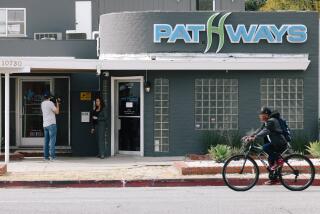Authorities Crash Kevorkian Session With Ill Woman
- Share via
SOUTHFIELD, Mich. — Prosecutors and police broke into a counseling session Friday between Dr. Jack Kevorkian and a California woman with spinal cord disease who wanted him to help her die, his lawyer said.
Kevorkian was meeting with 60-year-old Isabelle Correa in a hotel room in nearby Bloomfield Township when two Oakland County prosecutors and several officers “burst” in, said Kevorkian’s lawyer, Geoffrey Fieger.
“They break into a room of a woman who is a paraplegic and is talking to a doctor,” Fieger told a news conference. “Kevorkian committed no crime. Isabelle Correa is not a criminal.”
Fieger emphasized that Kevorkian was only talking to the woman, and no decision had been made on whether he would help her commit suicide. Fieger said the woman has a spinal cord disease that causes numbness and burning and has left her arms weak and her hands snarled.
“They invaded my privacy,” said Correa, who accompanied Fieger at the news conference. She said repeatedly that she was not depressed and knew what she was doing. “‘I came to die,” she said.
Kevorkian did not appear at the news conference.
An Oakland County sheriff’s dispatcher refused to release any information Friday night. Oakland County Prosecutor Richard Thompson’s home phone was busy late Friday. There was no answer at the home of Larry Bunting, another prosecutor accused of coming to the hotel room.
The prosecutors said they were there to save Correa, whose husband escorted her to Michigan, Fieger said. He said police showed no search warrant and that he plans to file a lawsuit.
Meanwhile, Kevorkian said in an interview Saturday in the New York Times that he has helped in more suicides than the 39 he had previously acknowledged.
*
Neither he nor Fieger would discuss exactly how many assisted suicides they had not disclosed. The number is believed to be small, the paper said.
Kevorkian reiterated his belief that doctor-assisted suicide should be available to patients who want to die with dignity.
“This is the way it should be: at home, in private, with the family, peaceful, and without police or medical examiners or any other people who have no business there,” Kevorkian told the paper.
More to Read
Sign up for Essential California
The most important California stories and recommendations in your inbox every morning.
You may occasionally receive promotional content from the Los Angeles Times.













